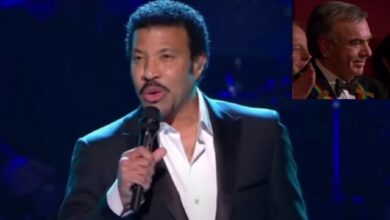Feel the Sorrow in Dwight Yoakam’s “I Sang Dixie,” A Heart-Wrenching Country Classic
“I Sang Dixie” by Dwight Yoakam is not only a hallmark of his musical career but also a touching tribute to the cultural roots that form the bedrock of country music. Emerging in a time when country was experiencing a renaissance, this song serves as an example of how Yoakam adeptly fuses traditional elements with a contemporary twist. Yoakam, hailing from Pikeville, Kentucky, has always carried the essence of Southern storytelling within his music, and “I Sang Dixie” is a prime illustration of this narrative quality that defines much of his work. The lyrics take listeners on a journey through the poignant memories of a man reflecting on his past while grappling with the feelings that accompany changing circumstances and geographical displacement.
The song opens with a reflective tone, setting up a narrative that is both personal and universal. The protagonist’s reminiscence about his Southern upbringing draws a vivid picture of a region steeped in musical and cultural historical significance. The yearning for a simpler time and place is palpable, resonating deeply with listeners who may find themselves similarly grappling with their own roots. This longing for the South is not just about nostalgia; it touches upon the broader themes of identity and the continuous tug-of-war between where one comes from and where one is going. The storytelling is rich and layered, showcasing Yoakam’s adeptness at weaving together his own experiences with those of his audience, thus creating a shared emotional landscape.
Musically, “I Sang Dixie” stands out with its quintessential country instrumentation that brings a sense of authenticity to the song. The lush steel guitar complements Yoakam’s heartfelt vocals, and the rhythm fosters a feeling of both urgency and familiarity. The production manages to encapsulate the sound of traditional country music while still feeling fresh and invigorating, thanks to Yoakam’s modern sensibility. Each note and chord progression serves to elevate the emotional weight of the lyrics, inviting fans to sing along while also encouraging introspection. This kind of musical arrangement is indicative of how Yoakam has always understood the importance of blending various influences in order to create his sound, which often skirts the lines between country, rock, and bluegrass.
The song was not just a commercial success, but it quickly garnered critical acclaim. Music reviewers highlighted the lyrical depth and Yoakam’s impressive vocal delivery, noting how the song became a staple in his live performances. The importance of the live rendition cannot be overstated, as Yoakam is known for his electrifying stage presence. This connection with his audience during live shows is where “I Sang Dixie” truly shines, transforming into an almost communal experience wherein both the artist and fans share in the reflections and emotions evoked by the lyrics. The chorus, in particular, often becomes a moment of collective memory, as concert-goers join in singing, reinforcing that bond.
As a product of both the 1980s’ country resurgence and the evolution of the genre, “I Sang Dixie” has influenced a new generation of artists who look to Yoakam’s work as a template for integrating traditional roots while pushing boundaries. Over the years, many musicians have covered the song or drawn inspiration from its themes, further solidifying its place in the musical canon. The timeless elements of memory and identity explored in the song resonate across diverse generations, showcasing how the power of storytelling in music transcends time.
In the larger context of his career, Dwight Yoakam has maintained a formidable presence in country music for decades. Known for his blend of honky-tonk and rockabilly, he has carved out a niche that allows for both commercial appeal and artistic integrity. His influence not only rests within his own catalog but extends to the numerous artists he has inspired and championed, as well as his role in the broader cultural landscape of Americana music. As a performer, collaborator, and songwriter, Yoakam’s contributions are substantial; he has continuously evolved while remaining grounded in the traditions that shaped him.
Throughout his career, Yoakam’s commitment to authenticity has made him a beloved figure in music. He has often expressed reverence for the legends who came before him, embodying their spirit while also forging his own path. This dual respect for the past and a visionary outlook for the future is a delicate balance that many artists strive to achieve, and “I Sang Dixie” serves as a perfect embodiment of that journey. The song reflects not only a personal history but also a broader cultural narrative that embodies the heart of Southern life.
As “I Sang Dixie” continues to traverse time, its ongoing resonance in country music is undeniable. Listeners find themselves not just reminiscing about the past but also contemplating their own stories and how those stories intertwine with the larger narrative of American culture. The power of the song lies in this shared experience of reflection, making it relevant even to audiences who may not share the same geographic roots but relate to the emotional journey it encapsulates. In this way, Yoakam’s work remains deeply interconnected with his audience’s experiences, creating a lasting legacy within the fabric of country music.
In conclusion, “I Sang Dixie” is much more than just a song; it is a narrative monument that captures the complex dance between memory and identity. Through emotionally charged lyrics and a distinctive musical arrangement, Dwight Yoakam not only pays homage to the past but also invites listeners to explore their own connections to place and time. This piece stands as a testament to Yoakam’s unparalleled artistry and the profound impact he continues to have on the genre, ensuring that his message resonates for years to come. As a lasting highlight of his illustrious career, “I Sang Dixie” remains a beloved gem that is celebrated by fans and new listeners alike, deeply ingraining itself in the heart of country music.





